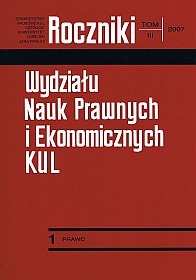Prawno-międzynarodowe podstawy walki z terroryzmem międzynarodowym analiza wybranych konwencji ONZ
Abstrakt
Every subject of international law. in order to be able to function efficaciously on the international arena and to face contemporary threat, depends in its activity on the solid law base which gives him adequate tools to do it.
The specific character of the international terrorism phenomenon causes that a necessity of establishing effective instruments is the more urgent the more real and touching the whole international community, is threat for the universal safety. As an answer for the situation, there was enacted a number of international conventions. They give for the subjects interested in that problem, many opportunities for react in the fight against terrorism. Among them there are the institution of extradition and passing on authors of an attempt: an obligation for states to send to each other information which could help in a terrorism prevention or in catching criminals after commitment of an attempt; a law help: acceptation of uniform principles which can help to lay down competences in jurisdiction of states to judge assassins. Moreover it was brought in the obligation for states of undertaking any indispensable means, including the proper changes in the native legislations, in order to exclude any possibility to refer to political, philosophical, ideological, racial, ethnic or religious nature as circumstances justifying an attempt committed. Conventions recommend also to coordinate the administrative actions of states and close cooperation between them, for example in the scope of undertaking researches and developing methods of detection of explosives and other harmful substances which could be used by terrorists, but also to consult each other in that sphere. With regard to the problem of fighting with financing the terrorist activity, the solid identification-controlling system and transparent principles of procedures in the system of fund flowing are the base in that case. Some of these law instruments guarantee effectiveness in prevention. Part of them are used after having committed the crime enabling to capture its authors. Nevertheless all the catalogue of good constructed law instruments is not sufficient to conduct an efficient activity against that kind of threat. But only the proper use of these tools and the close cooperation between states in that scope are the conditions which are necessary for the successful fight against international terrorism.
Bibliografia
Durys P., Jasiński F., Walka z terroryzmem międzynarodowym. Wybór dokumentów, Bielsko-Biała 2001.
Sutor J., Prawo dyplomatyczne i konsularne, Warszawa 1996.
Symonides J., Prawno międzynarodowe aspekty walki z międzynarodowym terroryzmem. „Sprawy Międzynarodowe” 2001, nr 4.
Wierzbicki B., Zagadnienia współpracy państw w zapobieganiu i zwalczaniu przestępczości, Białystok 1996.
Copyright (c) 2007 Roczniki Wydziału Nauk Prawnych i Ekonomicznych KUL

Utwór dostępny jest na licencji Creative Commons Uznanie autorstwa – Użycie niekomercyjne – Bez utworów zależnych 4.0 Międzynarodowe.

